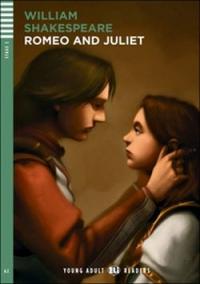Romeo and Juliet ( A2)
Dátum vydania: 14.01.2016
Romeo Montague was in love with Juliet Capulet. He went over to her. ‘I don’t know who you are’ he said. ‘But I know that I love you.’ ‘You’re very handsome,’ she replied. ‘I think I love you too.’ Romeo kissed Juliet and then they kissed again. They were in love. In this Reader you will find: - Information about William Shakespeare’s life ...
Detaily o knihe
Počet strán: 64
Väzba: Brožovaná Bez Přebalu Lesklá
Rozmer: 212x150x6 mm
EAN: 9788853605030
Rok vydania: 2016
Zákazníci, ktorí si kúpili túto knihu, si kúpili aj...
O knihe
Romeo Montague was in love with Juliet Capulet. He went over to her. ‘I don’t know who you are’ he said. ‘But I know that I love you.’ ‘You’re very handsome,’ she replied. ‘I think I love you too.’ Romeo kissed Juliet and then they kissed again. They were in love. In this Reader you will find: - Information about William Shakespeare’s life - Sections focusing on background and context - Glossary of difficult words - Comprehension activities - KET-style activities - Exit test Tag Love and Hate The story of Romeo and Juliet is probably the most famous love story of all time. It is set in mediaeval Verona and follows Romeo, son of the house of Montague as he falls in love with Juliet, daughter of the rival house of Capulet. The story moves quickly towards its conclusion as bitter hate and ancient rivalry lead to tragedy. William Shakespeare’s play is retold here as an exciting story, making it accessible to learners of English. Syllabus Nouns: abstract nouns, compound, nouns, noun phrases Pronouns: relative: who, which, that Adjectives: opinion, description, classification, participles as, adjectives, predicative and attributive Prepositions: place, time, movement, phrases, like Verbs: TENSE, ASPECT, FORM: Present, Perfect Simple: indefinite past, Past Continuous: background, actions/narrative, Future with going to, infinitives after verbs and adjectives, -ing forms, after verbs and prepositions, Present and Past Simple Passive, shall for offers, should for suggestions, must for obligation, need for necessity/obligations Types of Clause: defining relative clause: who, where, zero and type-one conditionals




















